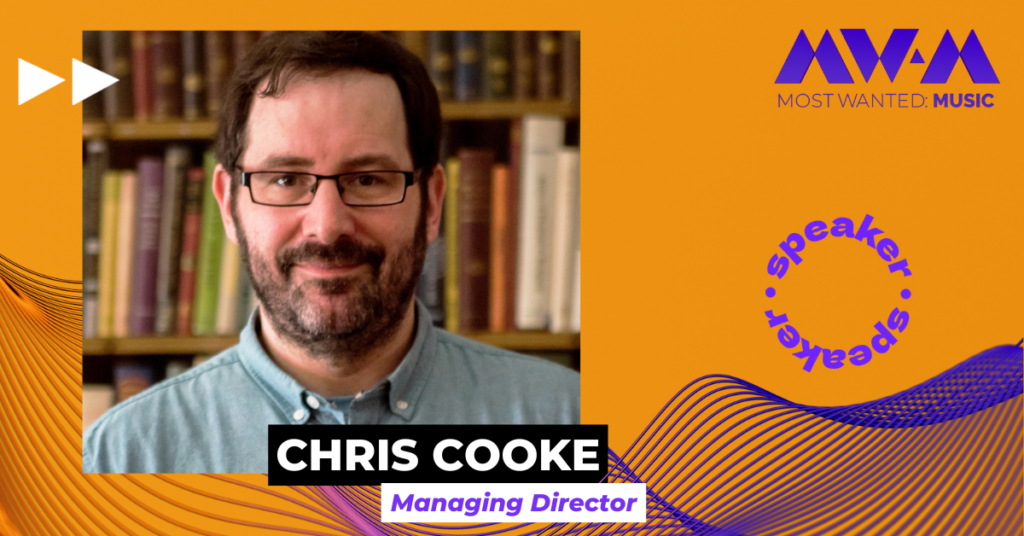Most Wanted: Music
News
content-full.php
Full-length Interview with Chris Cooke
In our MW:M Core Focus Newsletter #3, we spoke with platinum-certified songwriter, Linda Stark, and Chris Cooke, founder of the music industry media and consultancy firm CMU. We wanted to know how artists and songwriters can keep the advantages of the various platforms, data systems, and algorithms, while making sure that money created via this tech is shared fairly. We are excited to share the full interview with Chris with you below – enjoy reading!
Q: Technology has – supposedly – democratised just about every corner of the music industry, and yet plenty of people – DIY/indie artists and smaller labels for instance – still report that they are feeling the financial squeeze. In today’s industry, where does the financial power balance lie in the complex music business structure, and how should technology be moving that power – and where should it be moving?
The big shift to digital – in the way music is produced, distributed, consumed and marketed – removed many of the barriers to getting music to market, which was a brilliant thing.
It’s much, much easier to make and release music, which is why millions of music-makers are doing just that. But now millions of people are making and releasing music, while the record industry’s vast catalogues are also easily accessible, which means every music-maker is facing unprecedented levels of competition.
If we look at streaming income, the streaming services operate on a revenue share model, committing to hand over 65-70% of their revenues each month to the music industry.
Each track is allocated a portion of the service’s revenue based on what percentage of total consumption it accounted for. Then 50-55% of that allocation is paid to whoever controls the recording, and 10-15% to whoever controls the song contained in the recording.
Once you average everything out, the payment per play is fractions of a cent. However, there are billions of plays and, for the industry at large, streaming generates huge amounts of money. Yet many artists and songwriters make nominal income from streaming.
There are various reasons for this.
First, simply, the competition. You need to be getting millions of streams to make decent money and, given the huge quantity of music being released, that is a challenge. And artists with big fanbases – and artists working with record companies with big marketing machines – always have a big advantage.
Second, where an artist has signed a deal with a record label, they will be sharing streaming income with that label. Maybe the artist gets a majority of the money, maybe the label gets a majority of the money, maybe it’s a 50/50 split. Where the label keeps the majority, maybe that’s fair given its investment in the artist – which should help grow the artist’s other revenue streams – or maybe it’s not fair. Depends on the deal.
For artists that signed long-term record deals in the pre-streaming era, what share they are getting will depend on how their label is interpreting a record contract that doesn’t mention streaming. They could be getting a CD royalty rate of less than 20%.
Third, for songwriters, there are two issues. For various reasons, significantly more streaming money flows to the recording than the song. And because of data issues in the industry, the payment of song royalties is very inefficient, so a chunk of the money will be lost to admin fees, and payments may not reach the writer at all.
Fourth, in most countries, session musicians don’t earn anything from streaming, even if they performed on a track that gets millions of streams a month.
The big challenge for music-makers is that they are not involved in negotiating the licensing deals that dictate the streaming business model.
A small number of streaming platforms and large rightsholders negotiate those deals. So, I guess, ultimately, that’s where the financial power lies.
But music-makers and independent music businesses should make sure they understand how the business model works and that their concerns are heard, and the best way to do that is through trade bodies and industry organisations.
All that said, for frontline artists, there’s something else to consider. The most important change caused by the shift to digital was in the direct-to-fan relationship.
That relationship is hugely powerful and the opportunities to monetise it are still often under-utilised. This is where frontline artists have more direct control over how they capitalise on an opportunity created by digital innovation.
New technologies and platforms are further growing the opportunities in this domain. Whereas direct-to-fan was originally about having an online artist store selling physical products directly to fans, now it is also about providing superfans with premium digital content and experiences, with various different platforms able to assist in that process.
The challenge with direct-to-fan is that the products, experiences and platforms that work for each artist’s fanbase are very different. So, the artist and their team need to utilise all the fan data that is now available to identify what will work for them and their fans.

Q: “Fairness” is a complex topic when it comes to the music industry and money: what does fairness and parity look like to you, who does it apply to, and how far away from true fairness are we?
In terms of streaming and how digital income is shared out between the different stakeholders, there have been lots of debates about whether the current system is fair and, if not, how it could and should be changed.
As I said, the challenge for music-makers is that they are not involved in the licensing deals that dictate the business model, so they need to come together through trade organisations to understand the model and make sure their issues and challenges are heard.
In the UK, campaigning by music-maker organisations – including those that make up the Council Of Music Makers, which I consult for – resulted in a number of government-led initiatives to consider and address some of the issues with streaming.
The strand of work focused on how the money gets shared out only began earlier this year, so is still very much a work in progress. But at least we now have a forum where the issues and possible solutions can be formally discussed.
I am also a big advocate of transparency. It is definitely unfair that music-makers and their managers – and smaller independent music businesses too – are often not allowed to know exactly how royalties are being calculated and paid.
That information should be available as standard. There have been some improvements in this domain in recent years, but there is a lot more to be done.
I’d like a culture where, as soon as a new licensing deal is negotiated by a record label, music distributor, music publisher or collecting society, the lawyers leave the room, the communicators step forward and everybody asks: how can we effectively communicate this deal and how it works to all our stakeholders?
Q: If you could conjure one piece of music industry technology into existence (or completely overhaul one that already exists) that would help to change or divert money flow, what would you create, how would it work, and what positive changes would it bring?
So many issues could be addressed through full transparency of rights, so that the industry clearly declares who owns and licenses each copyright.
Technology has a crucial role to play in this, though developing the right technology isn’t currently the main challenge. It’s a political and commercial challenge.
Too many stakeholders don’t what that information publicly available or aren’t in a position to provide it. But in my opinion, if you can’t tell the world what specific rights you are licensing, you probably shouldn’t be licensing any rights.
If we can get full transparency of rights, there are developers and start-ups out there who can build brilliant tools that will make it easier for more digital platforms to launch, breaking up the dominance of a few small global players.
Plus, it will mean everyone gets paid accurately, efficiently and quickly, and we will finally properly respect the moral right to attribution that is a crucial component of copyright law.
Thanks to Chris for his sharp insights! Don’t miss him at MW:M24 where he will be moderating the panel PROs + CMOs + IME – Why register? and also presenting CMU’s 2024 Masterclass Sessions.



